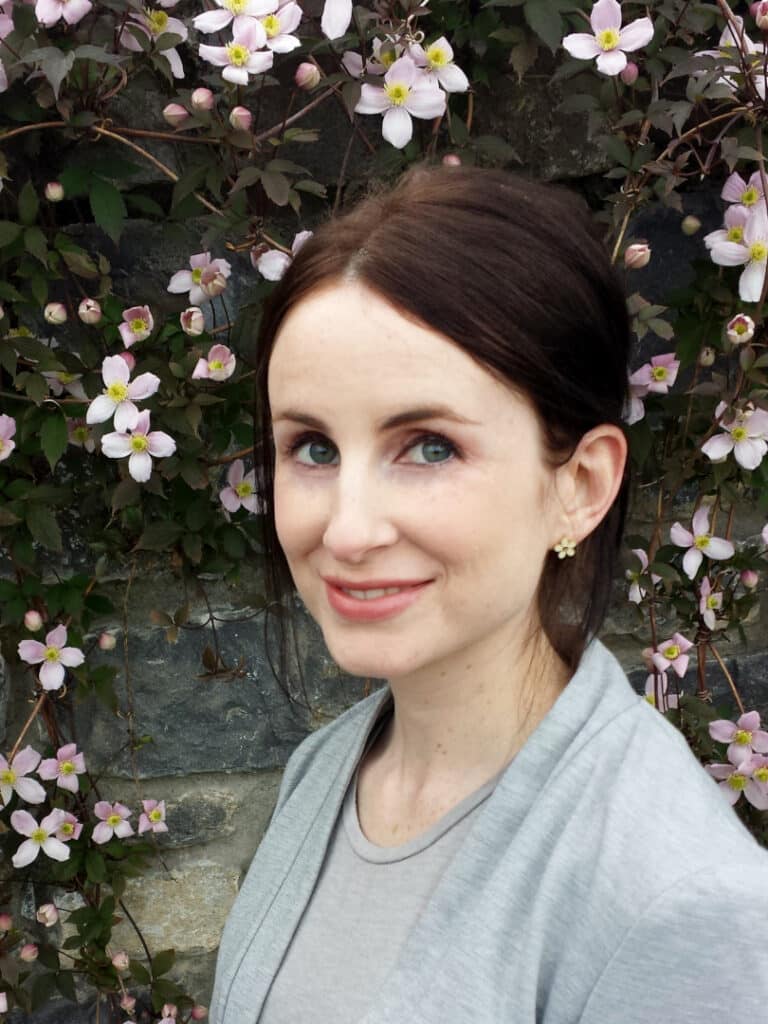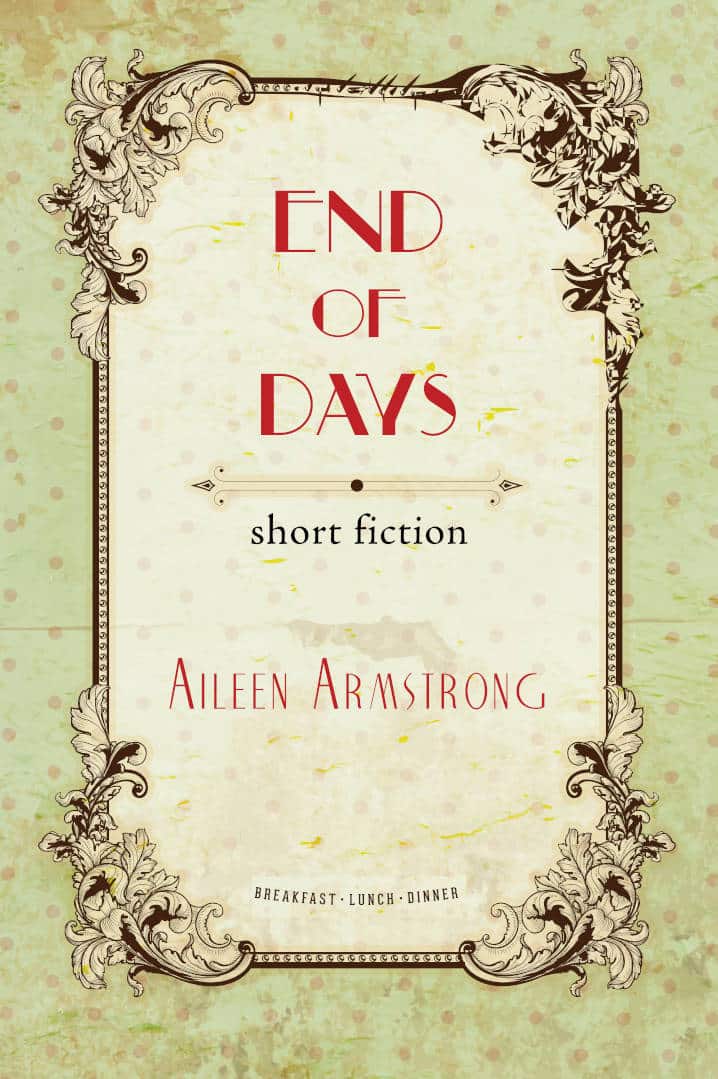Free shipping in Ireland over €25. Free worldwide shipping on orders over €50

AILEEN ARMSTRONG grew up in Sligo, Ireland, and now lives in Galway with her husband and daughters. She works as a technical writer in the mornings, and deliberates over fiction in the afternoons. A graduate of N.U.I. Galway’s M.A. in Writing programme, she was awarded a literature bursary from the Arts Council of Ireland in 2010. Her writing has appeared in The Stinging Fly, Three Times Daily, Cuadrivio, Some Blind Alleys and The Long Story, Short, as well as in Galway Stories. End of Days is her first collection of short fiction.
A stylish, confident debut… stories which unfold with a sinuous ease and patience to trap the reader in their uneasy world…
— Mike McCormack
They used that word for him, those two words rather, when they took down his details. They had to consult each other, have a little powwow about it. Marianne with her clipboard and that long spangled hair. Marcel with his skull’s face and those ridiculous earmuffs. They stood against the windows that looked out onto the grounds, their dark heads bent together; Marianne drumming the glass with ruby fingernails and Marcel sighing and shrugging his shoulders.
The boy sat and waited, huge, invisible. The lobby was dark and stagnant after the heat of the day, and he felt sure he was contributing to the smell. There was no air conditioning. There was nothing much at all. The check-in desk was a thin table sunk in the middle from the weight of the files piled high upon it. There was no computer, or vases of flowers, or piped music. There were garden chairs stacked against the walls, but, so far, no sign of a garden. The floor was red-tiled, uneven, covered in a fine layer of grit from outside. He had bounced uncomfortably on those tiles on the way in: the taxi driver, a large, amused Frenchman, had propelled his wheelchair across the lobby with the air of one who had now, finally, seen it all.
A dying wasp was crawling along the windowpane close to Marcel’s head. The boy watched it with interest. The wasp’s sputtering advances, its rising and falling, the way it flung itself feebly and angrily against the glass. It filled him with a dreamy calm. Already he felt that this new place, with its strange evening sunlight and fetid air—would swallow him whole. Already the old world was slipping away from him, the world of airports and laptops, and further away still, his school and Tennessee. All was now this lobby, and these two—this woman—in front of him, on whom he had staked all his hopes.
‘I’m just really tired,’ he said, when they were done talking. ‘Can somebody show me where the elevator is? I’d like to go to my room.’ They exchanged glances then. ‘Ah,’ said Marianne, widening her eyes at him. ‘Ah, well the thing is,’ she said.
‘The thing is,’ said Marcel, ‘we’re not really sure what you expected when you signed up for here. This is Europe, you know? This is an extremely old building. And it doesn’t actually have an elevator. Or rather,’ he said, swivelling around to Marianne and beetling his brows at her, ‘it doesn’t have a functioning elevator. We’re still working on getting it fixed. These things take time. You know? It’s not so easy with the cultural barrier. These men—’ Marcel turned to the window, shrugging sadly. ‘These men don’t like to be rushed. They’re doing the best they can.’
The three of them stared out the window. The boy in his wheelchair, Marianne in her dancer’s pose, Marcel all bundled up in his coat. The boy had never seen a man wear earmuffs before. Blue ones. They looked, the boy thought, fucking dumb. You do know it’s August, he nearly said to Marcel. But if Marcel looked dumb then how did he look? He was forgetting himself. His expectations were always too high. He had to strain his neck and lean forward in his chair to see out.
There were four men digging outside. The place was a mess. The churned up muck had revealed a delta of orange pipes around which the workers were picking their way hopelessly. Their scraggy biceps were shining with sweat. They seemed to be working silently, but it was hard to tell.
‘Did I mention,’ said Marcel, ‘that the workers refused payment?’ He shook that skull’s head, sad again. ‘A bottle of whiskey from the bar was all they wanted—can you believe that?’
Beside him, Marianne nodded slowly. The boy shifted around in his seat. He could feel his ass spilling out the sides of the wheelchair. He had a terrible feeling that he might cry.
‘Marcel?’ he said. ‘How am I supposed to get up the stairs?’
They both looked down at him. ‘I don’t do stairs,’ the boy told them. ‘I don’t do stairs.’ He was sure he looked proud of himself, but he wasn’t. He was just trying to not start bawling his head off, so he kept his face nice and tight. Sucked in his cheeks really hard.
‘Right, I see what you mean,’ said Marcel.
‘Yeah,’ said Marianne, gazing back out the window. ‘I guess that could be a problem.’
Marianne de Montaigne. A decade ago she had been the most famous yogi in Europe. Hounded by the Christian right when she claimed, in a US interview, that she could levitate. She got into drugs for a while, and after that, into dance. Now she was back in France and peddling her YogaDance Fit centre to American tourists. She lounged by the window, two hands behind her back, one foot stuck out before her. Degas’ surly ballerina. He’d spent a long time tracking her down.
‘Okay then,’ she said, turning away from the workmen. ‘Let’s figure this out. Let’s do the maths. It can’t be that difficult. Let’s see—you’re the American, right? Which room have we assigned you to?’
Marianne started to flip through the chart on her clipboard but Marcel touched her elbow and took it from her. ‘It’s just, you know,’ he said. ‘We’re all trying to figure this out right now. It’s a little challenging. It’s all a little—aaaghh!—you know what I mean? We’re getting there. When we’re done, this centre will be the best in Europe. I guarantee it. Right now though? It’s, uh, it’s a challenge.’
Marcel. Marianne’s husband. Wearer of blue earmuffs. Aged somewhere between thirty-five and sixty, hard to tell. The boy listened to him intently. He needed to be very, very, sure he was not going to misunderstand anything this time. Because that’s what seemed to be important when you were morbidly obese like the boy. You needed to understand things. You needed to know exactly what was happening and you needed people to stick to the plan. And if they made arrangements then you needed to know about those arrangements because you had to figure out what those arrangements really meant and what they really meant for you, for all three hundred and sixty-five pounds of you. And if it said in the brochure and on the website that there was an elevator in the hotel then you assumed that meant there was a working elevator in the hotel and that the hotel was actually a hotel and not some dilapidated fucking schoolhouse with muck and pipes spewing up over the lawn.

ISBN: 978-1-907682-26-1 | Pages: 112 | Published: 2013
A storm-battered Côte d’Azur to midsummer heat-waves and Big Freezes in the west of Ireland, the stories in End of Days capture the circumstances of change: the aftermath of loves lost and decisions made. A chef and his younger girlfriend take time out from their lives to make a road-trip deep into the heart of Connemara. A coffee shop manager spins plates — and family duties — in a snowstorm. A fashion designer, returning to his home town, joins an old friend for a dinner party and a trip down memory lane. Students on a study-abroad year receive a lesson in local culinary delicacies — and the basics. In this vivid debut collection, Aileen Armstrong sensuously documents the connected lives and broken bonds of an international network of friends and family, in territory where the hours are long and the odds of failing ever high.